HOMILY FOR MASS FOR 2ND SUNDAY OF ADVENT, YEAR A, + 60TH JUBILEE OF PRIESTHOOD OF BISHOP BERNARD O’GRADY OP MARIA REGINA CATHOLIC CHURCH AVALON

Your Excellency, Most Rev. Adolfo Tito Yllana, Apostolic Nuncio to Australia; My Lords, Most Rev. Peter Comensoli, Bishop of Broken Bay and Most Rev. David Walker, Bishop Emeritus of Broken Bay; Dominican Provincial Delegate, Fr David Willis OP; Fr George Kolodziej SDS, Parish Priest; my brother priests and fellow religious; Bishop Bernard’s brother Br Des O’Grady CFC and his cousins; principals of our local schools, parishioners and friends; above all our diamond jubilarian, the Bishop Emeritus of Gizo, Bishop Bernard O’Grady OP:
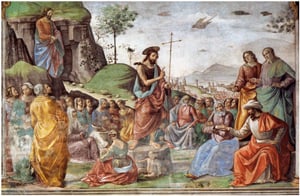
“You brood of vipers!” Not perhaps the liturgical greeting you’d expect hear from someone speaking for a God of love. But in today’s Gospel, John the Baptist is in full flight with preaching worthy of a PG or even M rating… Why such provocative language? Because our God is a God of love, undoubtedly, but He is a God of much else besides: He is God of mercy and of justice; He is intimate and distant; He is gentle but also all-powerful. So when God first revealed himself to Moses in the burning bush, it was no ‘love in’: Moses removed his shoes and hid his face in fear of the Lord (Ex 3:6).
God is awesome. Our words ‘awesome’ and ‘awful’, like the word ‘terrible’, sometimes signify a superlative, as when we say someone is ‘awfully capable’ or something is ‘terribly good’. Young people use the word ‘awesome’ to mean excellent. And we might describe ourselves as ‘awestruck’ at the sheer spectacle of the Milky Way, the Pacific Ocean, or a newborn baby. Yet the same very positive word can carry a sense of fear and quaking. The dictionary says awe is ‘A feeling of reverential respect mixed with fear or wonder’. When we say God is awesome, we don’t just mean He’s good, though of course He is, or that He’s cool, though He very well may be. When we say God is awesome, we mean He inspires, or should inspire, true reverence, amazement, both trepidation and delight.
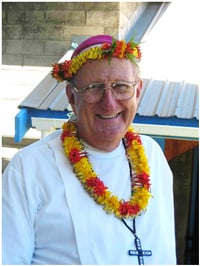
In our First Reading (Is 1:1-11; cf. Ps 71)) the gifts of the Holy Spirit are listed, including ‘the Fear of the Lord’ which we are told is the Spirit’s very breath. So as not to frighten children at Confirmation, we sometimes translate this as ‘Awe and Wonder’. But what is clear is that Jesus, ‘the noble shoot of Jesse’, comes not just with wisdom and insight, but with power and judgement. He adjudicates the needy with pity but the comfortable with integrity, as Isaiah says; “His word is a rod that strikes the ruthless, his sentences bring death to the wicked.”
Enter our advent saint, John the Baptist. He’s dressed rather like a Northern Beaches hippie and his diet is equally strange, though it’s locusts he munches rather than kale. He prepares ‘the way of the Lord’ through the landscape of our hearts, recalling God’s imminence but also His majesty. Our God is an awesome God and His prophet’s words a wake-up call. John was God’s alarm-clock and his message intentionally more confronting than an announcement there are only 20 shopping days till Christmas! John seeks to jolt us out of our complacency and make us aware of our need for the Christmas saviour, even if we are officially ‘spiritual’ people like the Pharisees and Sadducees (Mt 3:1-12).
For 60 years Bishop Bernard O’Grady OP has preached the word of God, welcome or unwelcome, seeking to inspire wonder and awe for God. How many times, I wonder, has he broken open the Word of God and the Bread of Life since his ordination on 1 December 1956? Perhaps 20,000 times! How many tongues have received the Blessed Sacrament from his anointed hands, how many foreheads the waters of Baptism or the sacred chrism of Confirmation or the oil of the Sick, how many hearts Absolution or blessing with the sign of the cross? Many thousands, I guess, a countless multitude…
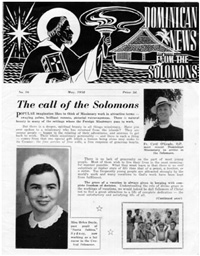
Born in Adelaide Bernard grew up in a Dominican parish where both sisters and friars told stories of their founder’s missionary zeal; his first bishop was also a Dominican, Archbishop Robert Spence. In 1950 the tall wiry 19-year-old entered the Dominican novitiate and was given the name Cyril in religion. He tells the me that three days into his first retreat he was so homesick he was tempted to go home. Yet a brush with polio as a child had left him with a stubborn streak which made him the kind who perseveres not only at tennis but also in his vocation. After years of study in Melbourne he was sent to finishing school at Wahroonga, in the future Diocese of Broken Bay, where he made friends who would endure right through to his semi-retirement back here. Soon after this he was sent in 1958 to the newly opened Dominican Mission in the Western Solomons.
The May 1958 number of the magazine Dominican News from the Solomons shows a very young Fr Cyril O’Grady OP newly arrived with a broad smile, straw hat and clerical collar. The front-page article explains that behind the natural beauty of the Islands, missionaries encounter a deeper, spiritual beauty in the people. The article suggested that four things were necessary for that vocation: “the willingness to give one’s life to God for the salvation of souls”, “at least average aptitude for missionary work”, “good health and character” and “a readiness for hard work”. Those four qualities the young Fr Cyril was to demonstrate in spades! His adventure took him to places like Moli, Nila and Choisel in the soon-to-be Diocese of Gizo (1964). He was called upon to apply his growing knowledge not just of theology, but also of languages and cultures, agriculture, seamanship and education in various parishes. Having received the most rudimentary training at the Mater before leaving Sydney, he found himself treating the natives: in one case an elderly man fainted when given an injection by ‘Doctor Cyril’, as he was known when handling a syringe. The man normally walked around completely naked, but on this occasion had decided to wear a T-shirt for modesty’s sake! In due course our missionary became Director of Education for the Gizo Diocese and was ultimately awarded an MBE for service to education as well as development work in the Western Solomons. His deep and abiding affection for the peoples of the Solomons is immediately evident as soon as he starts retelling his stories.
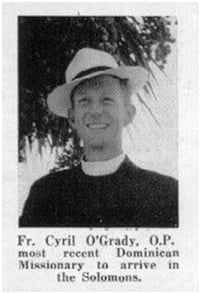
Not that it was all a South Pacific romance. In 2 Corinthians chapter 11 St Paul boasts that he has “worked much harder, been imprisoned more frequently, been flogged more severely, and been exposed to death more often” than any of the supposed ‘super-apostles’ then impressing the Corinthians. He’d been lashed, caned and stoned, he said, “three times shipwrecked, and once spent a night and a day floating in the open sea… in danger from rivers, from rascals, from believers and unbelievers; persecuted in the city, the country, on land and sea.” Indeed, he insisted, “I’ve laboured more than all the others, often sleepless, hungry, thirsty, cold or naked. All this I endured out of my concern for the churches…”. St Paul could be a bit of a bragger and this CV of his might have been somewhat dramatised. Yet when I consider what Bishop Bernard sustained – malaria, cyclones, storms, heat exposure, hunger, civil war, the near-destruction of his cathedral and community by earthquake and tsunami, and much else besides – I realise that such tales from the great missionaries are not just tall tales but true.
In 1981, as some light relief from his missionary adventures, Bernard was appointed Prior of the Dominican Novitiate and Retreat House at Blackfriars in Canberra, where he spent six years giving retreats and spiritual direction. I was one of his charges, and indeed it was Prior Cyril who received me into the novitiate and first clothed me in the Dominican habit. He later pursued spiritual direction at the Cross-Cultural Retreat Centre at Turkey Creek in the Kimberley, formation of future priests at the National Seminary in Bomana PNG, and parish renewal with the Dominican Parish Preaching Team from Chicago. While in the U.S. there was a fateful meeting with his future auxiliary bishop and now Archbishop of Honiara, Chris Cardone OP, and he was eventually tracked down by the Apostolic Nuncio to Australia who for several weeks had been pursuing him with the news that the Pope had appointed him a Bishop in the Solomons himself.
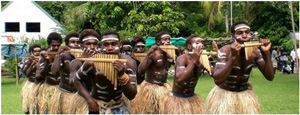
And so it was that on 15 May 1995 Bernard was ordained the second Bishop of Gizo, an office he fulfilled with distinction for the subsequent twelve years. He brought to his task his long existing passions for preaching, parish renewal, education and formation. On his retirement he was invited by Bishop David Walker to live and work in the Pittwater Parish here at Maria Regina church Avalon, and I know he has greatly enjoyed continuing to exercise a priestly ministry here. That he is doing so in what is now his 86th year is a great tribute to his generosity.
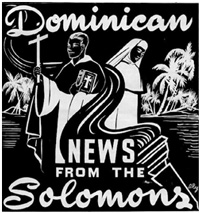
It is a privilege to be with Bishop Bernard and all of you to celebrate his 60 years of priesthood. I count it an honour to call him my brother in the Order, the priesthood, and the episcopate. He is a living testament to the extraordinary things that can come with the grace of the priesthood and perseverance for the sake of God and His people. He has always maintained his sense of mission, of humour and of service. Indeed, his life has been like St Dominic’s and St Paul’s but also like John the Baptist’s, a life of adventure, even hardships, but always of preparing a way for the Lord – a truly ‘awesome’ life that points to our awesome God. Thanks be to God for him!

